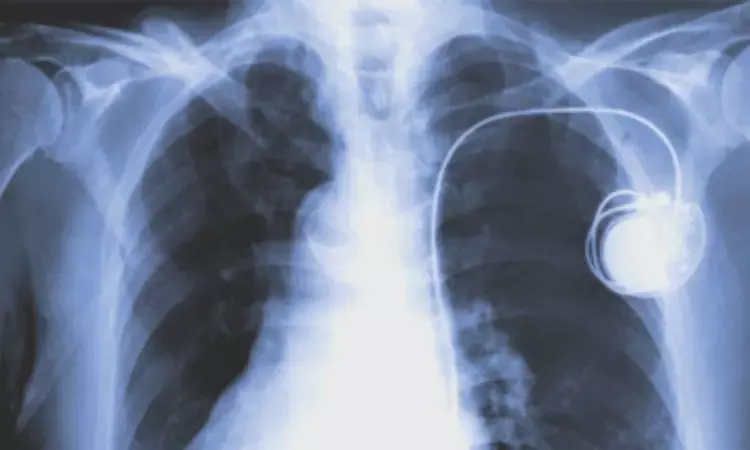- Home
- Medical news & Guidelines
- Anesthesiology
- Cardiology and CTVS
- Critical Care
- Dentistry
- Dermatology
- Diabetes and Endocrinology
- ENT
- Gastroenterology
- Medicine
- Nephrology
- Neurology
- Obstretics-Gynaecology
- Oncology
- Ophthalmology
- Orthopaedics
- Pediatrics-Neonatology
- Psychiatry
- Pulmonology
- Radiology
- Surgery
- Urology
- Laboratory Medicine
- Diet
- Nursing
- Paramedical
- Physiotherapy
- Health news
- Fact Check
- Bone Health Fact Check
- Brain Health Fact Check
- Cancer Related Fact Check
- Child Care Fact Check
- Dental and oral health fact check
- Diabetes and metabolic health fact check
- Diet and Nutrition Fact Check
- Eye and ENT Care Fact Check
- Fitness fact check
- Gut health fact check
- Heart health fact check
- Kidney health fact check
- Medical education fact check
- Men's health fact check
- Respiratory fact check
- Skin and hair care fact check
- Vaccine and Immunization fact check
- Women's health fact check
- AYUSH
- State News
- Andaman and Nicobar Islands
- Andhra Pradesh
- Arunachal Pradesh
- Assam
- Bihar
- Chandigarh
- Chattisgarh
- Dadra and Nagar Haveli
- Daman and Diu
- Delhi
- Goa
- Gujarat
- Haryana
- Himachal Pradesh
- Jammu & Kashmir
- Jharkhand
- Karnataka
- Kerala
- Ladakh
- Lakshadweep
- Madhya Pradesh
- Maharashtra
- Manipur
- Meghalaya
- Mizoram
- Nagaland
- Odisha
- Puducherry
- Punjab
- Rajasthan
- Sikkim
- Tamil Nadu
- Telangana
- Tripura
- Uttar Pradesh
- Uttrakhand
- West Bengal
- Medical Education
- Industry
Amiodarone therapy tied to increased all-cause mortality in ICD recipients: Study

Germany: The combined therapy with beta-blockers plus amiodarone has no unfavourable effect on the success of defibrillation testing compared to single beta-blockers in a "real life" cohort of ICD (implantable cardioverter defibrillator) recipients of the German DEVICE registry. The findings of the study were featured in Heart Rhythm.
The data suggested an increase in all-cause mortality with amiodarone therapy, particularly in the subgroups of patients with severely reduced left ventricular function or sinus rhythm. The rates of arrhythmic events were found to be similar in surviving patients.
Amiodarone is frequently used for antiarrhythmic therapy in ICD or CRT-D systems (cardiac resynchronization therapy defibrillator) recipients due to the lack of alternatives and owing to its antiarrhythmic potency. However, robust data on the safety and clinical utility of amiodarone therapy in these patients still need to be included. Therefore, Felix Wiedman from University Hospital Heidelberg, in Heidelberg, Germany, designed a study to evaluate the outcomes (periprocedural and post-procedural) of combined therapy with beta-blockers and amiodarone versus treatment with single beta-blockers in the recipients of ICD.
For this purpose, the researchers enrolled 4,499 patients who underwent ICD implantation, upgrade or revision in 49 centres who were participants of the German DEVICE Registry.
The study led to the following findings:
· The authors showed no significant effect of amiodarone on the success of defibrillation testing.
· Early implantation-associated complications were comparable between the groups.
· One-year overall mortality was notably higher in the beta-blocker plus amiodarone cohort (adjusted HR 2.09).
· Among the surviving patients, amiodarone was not associated with a remarkably reduced risk of ICD discharges or syncopal events.
· Among both groups, VT storm or incessant VT occurrence and the number of patients scheduled for intracardiac ablation did not differ. At the same time, the rehospitalization rate was lower in the people with sole beta-blockers.
"While amiodarone has no unfavourable effect on the defibrillation testing's success, our data indicate an increased all-cause mortality with amiodarone therapy, particularly in the subgroups of patients with severely reduced left ventricular function or sinus rhythm," the researchers wrote. "Rates of arrhythmic events were comparable in surviving patients."
Reference:
The study titled, "Single beta-blocker or combined amiodarone therapy in implantable cardioverter-defibrillator and cardiac resynchronization therapy defibrillator patients – insights from the German DEVICE-registry," was published in Heart Rhythm. DOI: https://doi.org/10.1016/j.hrthm.2022.12.009
Dr Kamal Kant Kohli-MBBS, DTCD- a chest specialist with more than 30 years of practice and a flair for writing clinical articles, Dr Kamal Kant Kohli joined Medical Dialogues as a Chief Editor of Medical News. Besides writing articles, as an editor, he proofreads and verifies all the medical content published on Medical Dialogues including those coming from journals, studies,medical conferences,guidelines etc. Email: drkohli@medicaldialogues.in. Contact no. 011-43720751


